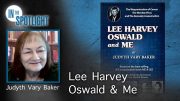"It doesn’t look like much from the outside," my older cousin advised on the ride from Grand Central Station to the Bronx. "It looks like a factory.’ But even the outside walls were impressive, with the words "YANKEE STADIUM" over the main entrance and all the pennants flying overhead. The sights, sounds and smells from the vendors selling food and souvenirs on the sidewalks outside the park added to the festive atmosphere. Suddenly we were walking through a different and enchanted world.
We entered through the dark underbelly of the stadium. We stopped to buy our scorecards and began our journey to the mezzanine. Along the way, I looked through a runway leading to the lower box seats and caught my first glimpse of the ball field. What I saw nearly bowled me over. It was grass. That’s right, grass. I had never seen grass quite so green. I had been used to watching ball games on television in glorious black and white, so the sight of the bright, green grass was a pleasant, even delightful surprise.
By the time we got to our seats, more colors overwhelmed my senses. Along with the bright, green grass there were the bright, blue fences. There was the rooftop façade and the train going by beyond center field. I looked out to the fences. The nearest one was in right field, barely 300 feet away, making the field a homer haven for the likes of left-handed sluggers like Ruth and Gehrig who had played there in the stadium’s early days. But out if centerfield, out past the monuments to the great Yankees of the past, was a centerfield fence that stood a majestic 461 feet from home plate. Over in left center was a marker indicating a distance only slightly less imposing — 457 feet. On over toward straightaway left was another reading 415. This was the place Red Barber called, "the big ballpahk." And no one, not even the mythical slugger Ruth nor the young phenom Mantle, had ever hit a fair ball out of Yankee Stadium. This was where men and ghosts had gathered for an afternoon of baseball, on this day a doubleheader with the Detroit Tigers. This was Yankee Stadium.
Down on the field were Yankees in their trademark white-with-blue-pinstripes uniforms with an interlocking NY printed over the left breast. The Tigers were in road gray. The home team was taking batting practice, another added treat that made the journey worthwhile. You don’t see batting practice when you watch a game on TV. Watching the sweet, smooth swings, hearing the delightful crack of the bat and watching baseballs go soaring through the air, I was as close to Heaven as any ten-year-old would want to be.
There were other sounds, too, sounds that still echo in mind’s hear, but which I was hearing then for the first time.
"Hey, scorecard! Get yer scorecard here!"
"Peanuts! Popcorn!"
"Beer here! Get yer ice cold beer here!"
Yes, those were ballpark sounds; that’s what made them so special. I was in Yankee Stadium, the House that Ruth Built, about to see two major league baseball games. I was beginning to understand that line from "Take Me Out to the Ball Game."
I don’t care if I ever come back!
And then there was that voice, that disembodied voice that seemed to come out of nowhere and yet was everywhere. That voice that sounded like the Voice of God.
"Ladies and gentlemen, boys and girls…"
It was the public address announcer, whose name I later learned was Bob Sheppard. He was welcoming us, in that deep, resonant voice, to Yankee Stadium. Then he gave the starting lineups, pronouncing each name slowly and emphatically, as though announcing the arrival of the President or some foreign potentate.
"Number 1, Billy … Martin, second base. Number 1. Batting third Number 7, Mickey … Mantle, center field. Number 7." The roar began even before he got to the first "Number 7" and grew so loud that Sheppard just managed to make his clearly enunciated "Mantle" (not "Mannel" as my father invariable pronounced it) heard above the din. The roar subsided, then resumed at a more normal level for Yogi Berra and the rest of the Yankees lineup.
That Voice that will speak forever in memory’s ear was silenced in real time on Sunday, July 11, when Bob Sheppard died at age 99. It will still be heard in a recording at Yankee Stadium, played whenever Derek Jeter comes to bat, as it has been by Jeter’s request, ever since Sheppard retired in 2006. It will be heard when Jeter comes to bat in Tuesday night’s All-Star game in Anaheim. It is the Voice that heralded the arrival of so many of the game’s greats and the not so great since the start of Sheppard’s incredibly long run at the stadium microphone on opening day, April 17, 1951. It was on that day that Mantle, a 19-year-old rookie, joined Joe DiMaggio and Jackie Jensen in the Yankees outfield. Ted Williams, Bobby Doerr and Lou Boudreau were among the future Hall of Famers with the visiting Red Sox that day. Like most celebrities, big league ballplayers like the sound of their own names. And no one made names sound more melodious or more important than Bob Sheppard.
“It was a cool thing when he introduced you for the first time,” Red Sox outfielder Mike Cameron told the Boston Globe Sunday “It really let you know you were in the big leagues.”
A native New Yorker, Sheppard was born in the Richmond Hill section of Queens on October 20, 1910. He was an outstanding student-athlete at St. John’s University in New York, earning seven letters in baseball and football before graduating in 1932. He earned a master’s degree from Columbia University the following year. He was a semipro quarterback after college and became a speech teacher in the city school system and a professor at St. John’s. He served in the Navy during World War II before resuming his teaching career. In the late 1940s, he landed a part-time job as an announcer for the Brooklyn Dodgers of the All-America Football Conference, which led to the job with the Yankees that lasted 56 years, during which he worked approximately 4,500 ball games. Of those, 121 were postseason games, including 61 games in 22 World Series. He also was the public address announcer for the New York Giants of the National Football League, for Army football games at West Point and for the annual Army-Navy game. He also announced professional soccer games.
Sheppard has been honored with a plaque in Monument Park at Yankee Stadium and one of the microphones he used is on display at the Baseball Hall of Fame. His voice has been heard in five motion pictures and numerous TV shows. The New York chapter of the Baseball Writers of America Association presented him with the William J. Slocum Award for long and meritorious service.
He was ever conscientious in his work, always striving for what he called the three C’s that would keep his famous intonations "clear, concise, and correct." Late in his career he would, despite his advanced age, frequently visit dugouts and talk with broadcasters before games to be sure his pronunciation of new players’ names was correct. Despite his fame and longevity as the public address announcer at baseball’s most storied park, he refused to let that job define him, at least in his own mind.
“I would rather be known as a good teacher of speech than as a public address announcer. It’s more important to me in my life,” he said in an interview in 2000. “People don’t know of me as a teacher. They think, ‘Oh that’s the guy who works at Yankee Stadium 81 days a year.’ That’s shortsighted.”
It’s a good thing that Sheppard did not take his role and his famous voice too seriously in this life, since his cannot be the Voice of God in the next. It will no doubt be close, though — close enough, perhaps, to occasionally fool even some of the angels and saints and more than a few players and fans who have gone before him.
Photo: A scoreboard image of Bob Sheppard addressing the crowd at Yankee Stadium Sept. 21, 2008 before the final regular season baseball game at the stadium: AP Images



